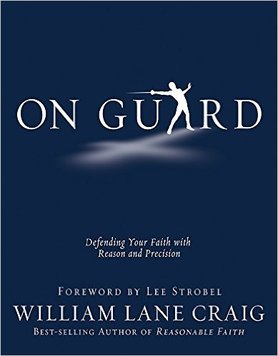| Now that Craig has established his positive case for God, he pulls back and begins to attack some of the counter claims of atheists. One of the main issues opponents to God bring up is that of evil. If God were all powerful, certainly he would be able to stop evil. If God were all loving, certainly he would want to stop evil. And if God were all knowing, certainly he would know when evil would arise, by whom, etc. It seems, then, that an omnipotent, omniscent, omnibenevolent god would be incompatible with a world that contains evil. Before countering the notion that a world where evil exists is incompatible with God, Craig puts |
|
forward a very important distinction in the argument from evil. Since the issue is such an emotionally charged one, it is important to distinguish between the emotional problem of evil and the intellectual problem. Most of the time, individuals are dealing with the emotional problem. The pain of evil is so deep and so real, that loving God in that moment of suffering seems incomprehensible. Like the child who cries "I hate you" to her parents as she experiences punishment or disappointment, so it is with us. But just as disdain does not make parents non-existent entities, so it does not make a positive case against God.
0 Comments
In this next chapter, "Why Did the Universe Begin?" Craig begins to move beyond abstract philosophy, and starts to bring in some of the scientific evidence we find in the universe. It is an important chapter for understanding the more abstract ideas laid out in the previous chapter, and it helps the reader to really begin understanding the weight of the dilemma atheists face. It also helps the reader to understand the tremendous evidence for a being outside of the universe. It still does not point us to the Christian God, but we are moving more and more in that direction, as Craig continues building the positive case for God.
Basic Argument: (also found here)
1. Everything that exists has an explanation of its existence [either in necessity of it's own nature, or an external cause]. 2. If the universe has an explanation, that explanation is God. 3. The universe exists. 4. Since the universe exists, it must have an explanation of its existence. 5. That explanation is God. The argument above is unarguably logically valid. IF the premises are true, the conclusion MUST be true. Obviously, atheists will not agree with the conclusion, so they must disarm the argument by disproving at least one of the premises 1-3. Therefore, Craig spends most of his chapter defending the premises.
Some recognize that objective morality exists, but don’t recognize its grounding in God. And some people deny that God exists altogether. This particular topic, the absurdity of life without God, starts from the very beginning. It is largely geared towards individuals who view meaning, value, and morality as being wholly independent of a divine being. Therefore, it is a particularly powerful argument to use with atheists. However, it is also a great discussion to have with Christians who are doubting their faith, or considering the strengths of atheism. This topic provides us with the motivation to seek out whether or not God exists, and spurs us on to find the deeper answers of how those aspects play out. While it doesn't lay out evidence for the existence of God (Craig will do that in the next chapter), it does paint a vivid picture of what a life lived consistently and without delusion should look like under atheism.
|
*The views and ideas on this site are in no way affiliated with any organization, business, or individuals we are a part of or work with. They're also not theological certainties. They're simply thinking out loud, on issues and difficulties as I process things.
Categories
All
|








 RSS Feed
RSS Feed